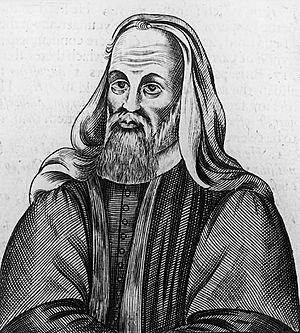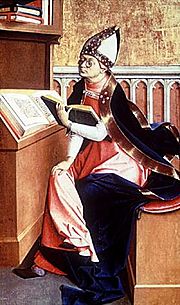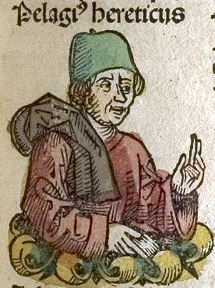Pelagius facts for kids
Quick facts for kids
Pelagius
|
|
|---|---|

A 17th-century Calvinist print depicting Pelagius
|
|
| Born | |
| Died | |
| Years active | c. AD 390 – 418 |
| Theological work | |
| Era | Patristic age |
| Main interests | Free will, Asceticism |
| Notable ideas | Pelagianism |
Pelagius (/pəˈleɪdʒiəs/; c. 354–418 AD) was an important Christian thinker from ancient Britain. He is known for teaching that people have a lot of choice in their own salvation. He believed that humans are not born with "original sin," which is the idea that all people inherit sin from Adam.
Pelagius was accused of teaching ideas that were against the main Church beliefs. This happened at a meeting in Jerusalem in 415 AD. His ideas were strongly criticized by another famous Christian leader, Augustine of Hippo. Augustine disagreed with Pelagius's views on human nature and how much people are responsible for their own actions. Pelagius especially believed in the power of human free will. We don't know much about Pelagius's personal life.
Contents
Early Life and Ideas
Pelagius was active as a teacher and writer between about 390 and 418 AD. People who lived at the same time as him, like Augustine, said he was from Britain. Some even thought he might have been Irish. He was described as tall and well-built.
Pelagius was also very educated. He could speak and write both Latin and Greek very well. He knew a lot about Christian teachings. His name might come from a Greek word meaning "sea," similar to the Welsh name Morgan.
Around 380 AD, Pelagius moved to Rome. There, he became known for living a very strict and simple life. He also wrote letters to other important people, like Paulinus of Nola.
Pelagius strongly disagreed with a famous quote from Augustine's book, Confessions. Augustine had written, "Give what you command and command what you will." Pelagius felt this idea took away human responsibility. However, some historians are not sure if this event really happened.
When the city of Rome was attacked in 410 AD, Pelagius and his follower, Caelestius, went to Carthage. He continued his work there.
His Opponents
Pelagius's ideas, called Pelagianism, quickly spread, especially around Carthage. Other Christian leaders became worried about these teachings.
Augustine of Hippo
Augustine of Hippo was a very influential bishop and writer. He wrote several books to argue against Pelagius's ideas. In these writings, Augustine strongly stated that "original sin" does exist. He also said that babies need to be baptized to wash away sin. Augustine believed that people cannot live a life without sin unless they have God's help, called "grace." Augustine is a key source for what we know about Pelagius's life and beliefs.
Jerome
Pelagius later moved to a region called Palestine. There, he became friends with a local bishop. Another important Christian scholar, Jerome, also lived in Palestine and became involved in the debate. Pelagius had criticized some of Jerome's writings. Jerome then wrote his own works against Pelagius.
Jerome was joined by Orosius, a student of Augustine. Orosius also thought Pelagius's ideas were dangerous. Together, they spoke out against Pelagius.
Church Meetings
A local bishop, John of Jerusalem, who was a friend of Pelagius, called a meeting in July 415 AD. At this meeting, Orosius tried to argue against Pelagius. However, Orosius did not speak Greek well, which made his arguments less clear. The meeting did not make a final decision. It sent the issue to the Latin-speaking Church because Pelagius, Jerome, and Orosius all spoke Latin.
A few months later, in December 415 AD, another meeting was held in Diospolis (now called Lydda). Pelagius explained his beliefs to the leaders there. He said that he did believe God was necessary for salvation. He also said that some ideas linked to his follower, Celestius, were not his own. Pelagius even showed letters of support from other important people, including Augustine himself, who respected Pelagius's character.
Because of Pelagius's explanations, the meeting in Diospolis decided that he was following the correct Church teachings. They said he belonged to the Catholic Church.
Pelagius's Teachings
Pelagius believed that everything God created was good. Because of this, he found it hard to believe that God would make humans fallen or sinful from birth. At the time, Augustine's teaching about the "Fall of Adam" (when Adam and Eve sinned) was not yet a widely accepted idea.
A core idea of Pelagius's teaching was that people can avoid sinning. He believed that humans can freely choose to obey God's rules. Pelagius strongly emphasized human freedom and the power of their own will. He wrote about this in his "Letter to Demetrias."
For Pelagius, "grace" (God's help) included the gift of free will, the Law of Moses, and the teachings of Jesus. Augustine, however, said that Pelagians believed that baptizing babies was not needed because babies had no sin. Celestius, Pelagius's student, also denied original sin and that babies needed baptism for salvation.
Condemnation
Pelagius tried to get his ideas accepted by the Church. He wrote a letter and a statement of his beliefs to Pope Zosimus, the new Pope. He argued that his beliefs were correct. Pope Zosimus was at first convinced by Celestius to look at the case again.
However, many bishops in Africa and the Roman Emperor Honorius strongly opposed Pelagius's ideas. Because of this pressure, Pope Zosimus was forced to change his mind. In 418 AD, he officially condemned and removed Celestius and Pelagius from the Church.
Pelagianism was also condemned at a major meeting called the Council of Carthage in 418 AD. Augustine had called this meeting because he was surprised that Pelagius and Celestius had not been declared heretics earlier. This meeting issued eight important rules:
- Rule 1: Adam was not created to die.
- Rule 2: Babies should be baptized to remove sins.
- Rule 3: God's grace not only forgives sins but also helps us stop sinning.
- Rule 4: God's grace gives us knowledge, inspiration, and the desire to do what is right.
- Rule 5: Without God's grace, we cannot do anything good.
- Rule 6: The statement "If we say that we have no sin we deceive ourselves" is true, not just a humble thing to say.
- Rule 7: In the Lord's Prayer, holy people pray "Forgive us our trespasses" not just for others, but for themselves too.
- Rule 8: Holy people pray "Forgive us our trespasses" because they have sinned, not just out of humility.
Later Impact
After he was condemned, Pelagius was sent away from Jerusalem. He was allowed to live in Egypt. We don't hear anything more about him after that.
Even after his death, Pelagius's teachings continued to spread. However, those who followed him might have changed his ideas over time. We don't have much information about Pelagius's exact teachings. This means that his ideas might have been changed or hidden by his opponents, like Augustine and the Church leaders.
Pelagius and Caelestius were officially declared heretics (people who hold beliefs against Church doctrine) by the First Council of Ephesus in 431 AD.
Beliefs similar to Pelagianism were common for several centuries, especially in Britain, Palestine, and North Africa. Important figures like Saint Germanus visited Britain around 429 AD to fight against Pelagianism. In Wales, Saint David is said to have held meetings against Pelagius's followers in the sixth century.
How We See Him Today
For a long time, Pelagius was seen as a very bad "heretic" because of the Church's condemnations in the 400s. However, in recent times, some scholars have started to look at him differently. They see him as a Christian thinker who was unfairly criticized. His writings on the letters of Saint Paul were popular in the Middle Ages, but people often thought they were written by other authors.
It's hard to have a completely fair view of Pelagius. His name has been used as an insult for centuries by both Protestants and Catholics. He has had very few people defending him. The early Church rejected his ideas. Later, during the Reformation, Protestants accused Catholics of holding beliefs similar to Pelagius.
Modern scholars suggest that Pelagius himself did not hold the most extreme views that were later linked to his followers. Historian Ronald Hutton called him "a first-rate theologian."
Theologian Carol Harrison said that if Augustine had not won the debate, Pelagius might have offered a very different way of understanding humans, responsibility, and salvation. According to Harrison, Pelagianism tried to protect God's fairness and the idea that human nature, created by God, is good. It also emphasized that humans have a duty and ability to live a perfectly righteous life. However, this view might have downplayed how weak humans can be.
Scholar Rebecca Weaver noted that Pelagius's most unique idea was his belief in a completely free choice. He thought this freedom was given by God and could not be changed by sin or life's situations.
In 1956, John Ferguson wrote that if a heretic is someone who focuses too much on one truth and ignores others, then Pelagius was no more a heretic than Augustine. He believed Pelagius's main fault was over-emphasizing certain points. Ferguson suggested that Pelagius's final ideas, after being changed by criticism, might not be completely against Christian faith.
Writings
We only have a few of Pelagius's complete works today. These include:
- On Faith in the Trinity: Three Books
- Excerpts out of Divine Scriptures: Book One
- Commentary on the Epistles of Saint Paul
Sadly, most of his writings only survive because his opponents quoted parts of them. It has only been in the last hundred years that scholars have identified some works as truly written by Pelagius.
Other writings include On Nature, which Augustine quoted in his book On Nature and Grace. Also, Defense of the Freedom of the Will was quoted by Augustine in On the Grace of Christ. We also have his letter to Demetrias and parts of other letters. There is also the written statement of faith that he sent to Pope Zosimus.
See also
 In Spanish: Pelagio para niños
In Spanish: Pelagio para niños
- Julian of Eclanum
 | Delilah Pierce |
 | Gordon Parks |
 | Augusta Savage |
 | Charles Ethan Porter |



